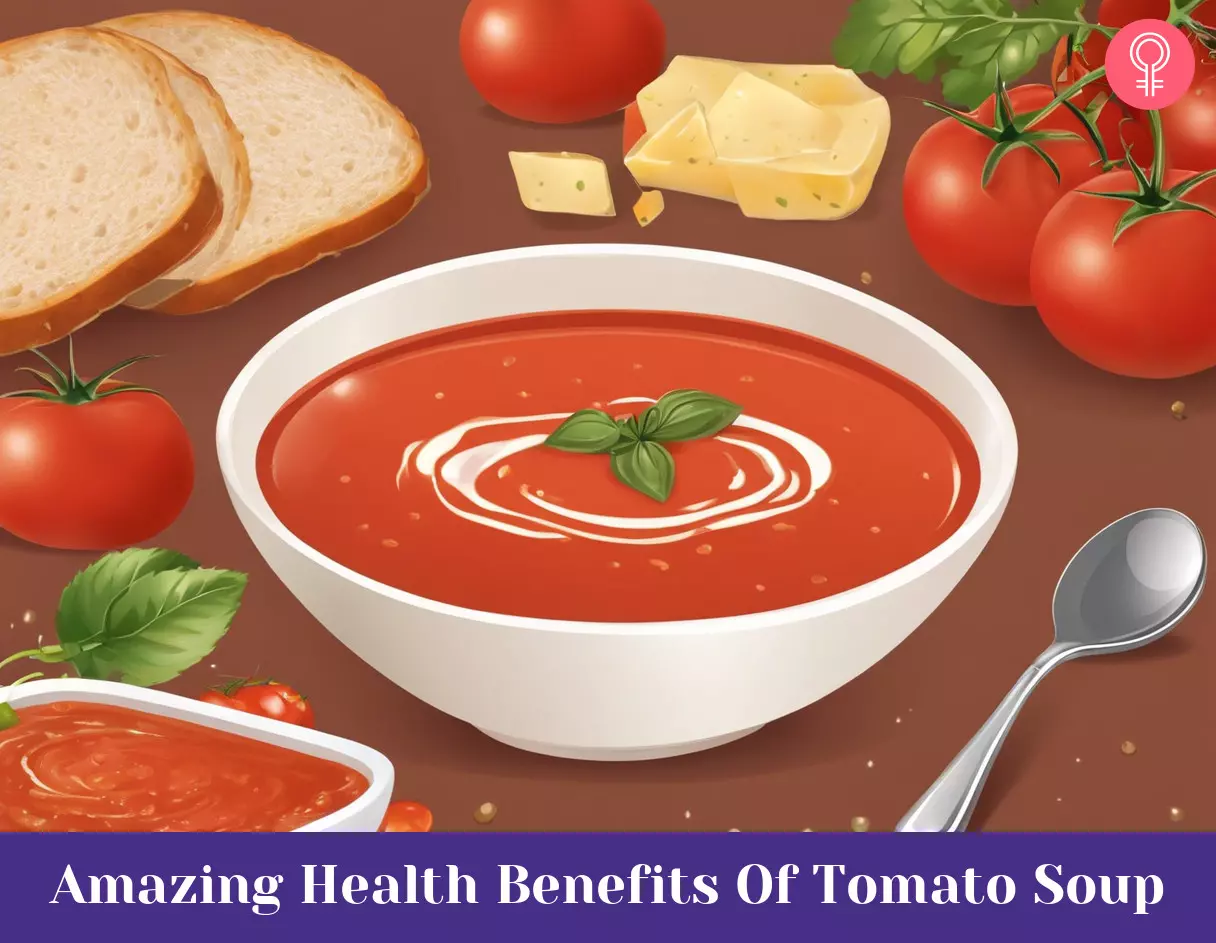12 Amazing Health Benefits & Uses Of Tomato Soup
Enjoy the delicious yet low-calorie red-hued soup with many health benefits.

Image: shutterstock
A bowl of thick creamy tomato soup perfectly suits the chilly winter days. “Is tomato soup good for you?” is a common question, and the answer is that it can be a healthy choice as it is low in calories and fat, and high in vitamins and minerals. Yes, you read it right. This soup has a positive impact on your health!
This is one of the most consumed soups in India. Roasted tomatoes are stewed and pureed, which is then made into a creamy juice. It is then seasoned with various spices and herbs. Grilled sandwiches and tomato soup make the best combo. Continue reading to learn more about the benefits of tomato soup.
 Know Your Ingredient: Tomato Soup
Know Your Ingredient: Tomato SoupWhat Is It?
A healthy soup with tomatoes as its main ingredient.
What Are Its Benefits?
May aid in weight loss and diabetes management, and improve bone health.
Who Can Consume It?
Everyone can consume tomato soup except for people who commonly experience acid reflux.
How Often?
It is best to consume it around 2-3 times a week for optimal health.
Caution
Avoid consuming tomato soup if you have high blood pressure as it has high sodium content.
In This Article
Health Benefits Of Tomato Soup
you in several ways, as do tomato-based products. Each bowl of tomato soup simmers with several nutrients that are highly beneficial for health. It contains vitamins A, C, E, and K, essential minerals and antioxidants that can keep you healthy and fit (1). The health benefits of tomato soup include:
1. Bone Health

Lycopene found in tomato soup plays an important role in regulating bone metabolism by increasing bone mineral density, thus helping in fighting osteoporosis. Consuming tomato soup regularly reduces the blood levels of TNF alpha by 34%. A deficiency in lycopene can increase oxidative stress in the bones and bring unwanted changes in the tissues. You can keep these issues at bay by making tomato soup regularly during your meal times!

2. Cardiovascular Health

The high levels of vitamin C in tomato soup may provide arterial protection, strengthen the heart and protect it from diseases like blockage of arteries and stroke. It may also help to reduce the deposition of fats in the blood vessels, reducing bad cholesterol. Tomato soup may be able to prevent the clumping of platelet cells in the blood (5).
3. Disease-Fighting Lycopene
As mentioned before, tomato soup comes packed with lycopene, the pigment that gives the fruit its bright color. Processed tomatoes contain more lycopene than raw ones. Lycopene neutralizes the oxidative damage caused by the free radicals, a molecule that causes aging. A diet rich in lycopene can also help fight chronic diseases and stroke (6). A cup of tomato soup provides 13.3 milligrams of lycopene. That’s enough to keep your body fighting fit!
4. Blood Circulation
Selenium in tomato soup promotes blood circulation, preventing anemia (7), (8). One of the amazing benefits of tomato soup! One serving of tomato soup provides 7 micrograms of selenium, amounting to 11% of the daily recommended allowance.
5. Mental Health

The high concentrations of copper in tomato soup boost the nervous system (9). Potassium aids in the transmission of nerve signals. All these ensure that your mental health remains top-notch.
 Trivia
Trivia6. Vitamins
Tomato soup is an excellent source of vitamins A and C. Vitamin A is required for tissue development. It is also an essential nutrient for vision health. It activates the genes of the newborn cells, helping them grow into mature tissue. A bowl of tomato soup provides 16% of the daily recommended value of vitamin A. A bowl of tomato soup provides 16% of the daily recommended value of vitamin A. Vitamin C is required to maintain healthy tendons and ligaments. Tomato soup provides 20% of the daily recommended value of vitamins. So, a bowl full of tomato soup a day can definitely help to keep the body healthy (10).
7. Weight Loss

Consuming tomatoes may benefit weight loss (11). It can be very beneficial for those who are on a weight-loss diet. It is rich in water and fiber that keeps you full for a longer time. Dieters recommend tomato soup as a low-calorie and low-fat diet for the body as a yummy way to lose weight.
8. Cancer
Tomato soup contains antioxidants like lycopene and carotenoid, which can help in the possibility of cancer prevention in both men and women. The high levels of antioxidants in tomato soup reduce oxidative stress and chronic inflammation. Consuming tomato soup thrice a week may help to prevent breast, prostate, and colon cancer. It also protects the body from stomach and colorectal cancer (12), (13).
9. Male Fertility
Research shows that a special tomato juice benefit for men is its ability to boost fertility. Tomato juice contains lycopene, which can improve sperm motility (14). The antioxidants in tomato juice also help to scavenge free radicals, which can cause infertility in men (15). So, if you are trying to conceive, add tomato soup to your diet!
10. Diabetes

Tomato soup can be an excellent addition to a diabetic patient’s diet. It contains chromium, a mineral that helps in the regulation of blood sugar(16), (17).
11. Hydration
Tomato soup may help you stay hydrated. Tomatoes contain 84% water and other essential nutrients that may help replenish body fluids (18). Moreover, soups are mostly liquid and contain water and other hydrating elements like broth and vegetables. Therefore, they can serve as a vital source of hydration. The soup’s sodium content also plays a role in retaining water, helping the body stay properly hydrated (19).
12. Immunity
Tomato soup may boost immunity mainly due to the presence of lycopene, beta-carotene, and vitamin C in tomatoes. Vitamin C boosts immune cells like T-lymphocytes and natural killer cells that are crucial for fighting infections and cancer. Similarly, beta-carotene enhances the activity of immune cells. These compounds in tomatoes help strengthen the body’s immune response against diseases (20).
 Did You Know?
Did You Know?Key Takeaways
- Tomato soup is super rich in vitamins C and A, which provide 20% of the daily recommended value of vitamins.
- It may improve bone and cardiovascular health and aid in weight loss.
- Avoid excess consumption of tomato soup due to its high sodium content, which may cause kidney damage.
A Word of Caution:
The only disadvantage of tomato soup is its high sodium content. A bowl of tomato soup contains one-third of the daily limit. Excess consumption of sodium increases blood pressure, which can damage the kidney, heart and blood vessels (21). If you are purchasing packaged tomato soup, select the one with lower sodium content.
I am sure you love tomato soup–most of us do! But now you can binge on it without feeling guilty. A bowl of tomato soup can be your health’s best friend! If you need the best tomato soup recipe, scroll down.
Tomato Soup Recipe
You can prepare simple homemade tomato soups by simply blending roasted tomatoes with garlic, onion, herbs, and spices. Here is a quick recipe you can try.
Ingredients
- 2 tablespoons olive oil
- 8-10 fresh tomatoes, chopped
- 1 cup water or vegetable stock
- 1 onion, chopped
- 1 teaspoon garlic, minced
- 1 teaspoon oregano
- 1 teaspoon salt
- ½ teaspoon chili powder
- 1 tablespoon basil leaves, chopped
- ½ teaspoon balsamic vinegar (optional)
- ½ teaspoon sugar (optional)
How To Prepare
- Heat the oil in a large pot over medium heat.
- Saute the onions for 4-5 minutes or until soft and translucent.
- Add garlic and saute for another 2-3 minutes.
- Add chopped tomatoes, vegetable broth, salt, oregano, and chili powder.
- Cook for 10 more minutes or until the tomatoes are soft.
- Turn off the heat and add everything to the blender after it has cooled down a little.
- Blend well and add to the pot again.
- Add sugar and balsamic vinegar if you want a sweet and tangy flavor.
- Add more water if required and bring the soup to a boil.
- Simmer for 5-10 minutes.
- Garnish with fresh basil leaves and serve.
You may follow this recipe as it is or customize it as per your taste and liking. Here are some tips for the same:
- Instead of boiling the tomatoes, roast them in the oven at 400°F for about 20-25 minutes. This will give your soup a deeper flavor.
- If you want a creamier texture, add in fresh cream before serving. For a dairy-free alternative, blend in some soaked cashews or add coconut milk.
- You may also add cucumbers and bell peppers to the soup and serve it cold. This refreshing recipe is known as gazpacho.
Infographic: Top 5 Health Benefits Of Tomato Soup
Tomato soup is a wonderful vegetarian addition to your daily diet, owing to its numerous health benefits. However, there are a few benefits that you can’t ignore. Check out the infographic below to learn the top 5 health benefits of tomato soup. Scroll down.
Some thing wrong with infographic shortcode. please verify shortcode syntax
Tomato soup is hearty and delicious. It fills your stomach and your heart. It is nutritious in every sense, as it offers dietary fiber, vitamins, minerals, and potent antioxidants. The vegan soup benefits include improved heart health, stronger bones, and better mental health. The dairy-free and gluten-free soup may also help boost circulation and fertility. In addition, it has been shown to promote weight loss and diabetes management. However, excess consumption may cause a few side effects, especially its high sodium levels leading to high blood pressure and other health complications. If you experience any side effects, limit your consumption and seek medical advice.
Frequently Asked Questions
Is tomato soup easy to digest?
Tomatoes contain nutrients and dietary fiber that are beneficial for the gut. However, due to its acidic content, some people may have difficulty in digestion.
Is tomato soup good for fatty liver?
Yes. Tomatoes may help prevent alcoholic fatty liver due to the presence of carotenoid lycopene (22).
Can tomato soup be used as a meal replacement option?
No. Tomato soup is low in calories and fat content, and may not contain enough protein, fiber, or other necessary nutrients to serve as a full meal replacement.
Can we drink tomato soup at night?
In general, tomato soup is a nutritious food choice that can be consumed any time of the day. However, some people may find that consuming spicy meals just before bed interfere with sleep and also cause digestive discomfort.
Is tomato soup good for the skin?
Yes. Tomato soup is rich in beta-carotene and lycopene, which can help protect your skin from sun damage and UV light (23).
Is tomato soup good for gas?
No. Much anecdotal evidence suggests that tomato soup is rich in fiber and natural sugars that can be difficult to digest for some people and cause gas, bloating, and constipation.
Is tomato soup rich in iron?
No. The quantity of iron found in a serving of tomato soup is often insignificant, considering the fact that tomatoes themselves contain a small amount of iron.
Is tomato soup good for hemoglobin?
Yes. Tomato soup is rich in selenium that helps promote blood circulation and hemoglobin levels (8).
Illustration: Amazing Health Benefits Of Tomato Soup

Image: Stable Diffusion/StyleCraze Design Team
Tomato soup is delicious, nutritious, and an absolute comfort meal. Click on this video to know more about its health benefits and potential side effects you should keep in mind before consuming it.
References
Articles on StyleCraze are backed by verified information from peer-reviewed and academic research papers, reputed organizations, research institutions, and medical associations to ensure accuracy and relevance. Read our editorial policy to learn more.
- Soup tomato low sodium with water
https://fdc.nal.usda.gov/food-details/171591/nutrients - The combined effect of vitamin K and calcium on bone mineral density in humans: a meta-analysis of randomized controlled trials
https://josr-online.biomedcentral.com/articles/10.1186/s13018-021-02728-4 - Potential Role of Lycopene in the Prevention of Postmenopausal Bone Loss: Evidence from Molecular to Clinical Studies
https://www.ncbi.nlm.nih.gov/pmc/articles/PMC7582596/ - Lycopene attenuates LPS-induced TNF-α secretion in macrophages and inflammatory markers in adipocytes exposed to macrophage-conditioned media
https://www.researchgate.net/publication/225080746_Lycopene_attenuates_LPS-induced_TNF-a_secretion_in_macrophages_and_inflammatory_markers_in_adipocytes_exposed_to_macrophage-conditioned_media - Tomatoes and cardiovascular health
https://pubmed.ncbi.nlm.nih.gov/12587984/ - Tomato lycopene and its role in human health and chronic diseases
https://www.ncbi.nlm.nih.gov/pmc/articles/PMC80172/?report=reader - Positive Effects of Tomato Paste on Vascular Function After a Fat Meal in Male Healthy Subjects
https://www.ncbi.nlm.nih.gov/pmc/articles/PMC6163719/ - Selenium Deficiency as a Risk Factor for Development of Anemia
https://www.researchgate.net/publication/322162749_Selenium_Deficiency_as_a_Risk_Factor_for_Development_of_Anemia - Copper: from neurotransmission to neuroproteostasis
https://www.frontiersin.org/journals/aging-neuroscience/articles/10.3389/fnagi.2014.00143/full - Enhancing the Health-Promoting Effects of Tomato Fruit for Biofortified Food
https://www.ncbi.nlm.nih.gov/pmc/articles/PMC3972926/ - Tomato juice supplementation in young women reduces inflammatory adipokine levels independently of body fat reduction
https://pubmed.ncbi.nlm.nih.gov/25837214/ - Tomatoes Tomato-Based Products Lycopene and Cancer: Review of the Epidemiologic Literature
https://academic.oup.com/jnci/article/91/4/317/2543924 - An Update on the Health Effects of Tomato Lycopene
https://www.ncbi.nlm.nih.gov/pmc/articles/PMC3850026/ - The effects of dietary lycopene supplementation on human seminal plasma
https://www.researchgate.net/publication/6346174_The_effects_of_dietary_lycopene_supplementation_on_human_seminal_plasma - The effects of tomato juice on male infertility
https://pubmed.ncbi.nlm.nih.gov/28049263/ - Tomato (Solanum lycopersicum L.) and type 2 diabetes
https://www.tandfonline.com/doi/full/10.1080/10942912.2018.1439959 - Molecular Mechanisms of Chromium in Alleviating Insulin Resistance
https://www.ncbi.nlm.nih.gov/pmc/articles/PMC3308119/ - Tomatoes, red, ripe, raw, year round average
https://fdc.nal.usda.gov/food-details/170457/nutrients - Effect of sodium in a rehydration beverage when consumed as a fluid or meal
https://pubmed.ncbi.nlm.nih.gov/9760324/ - Tomatoes: An Extensive Review of the Associated Health Impacts of Tomatoes and Factors That Can Affect Their Cultivation
https://www.ncbi.nlm.nih.gov/pmc/articles/PMC8869745/ - Sodium Intake and Hypertension
https://www.ncbi.nlm.nih.gov/pmc/articles/PMC6770596/ - Tomato lycopene prevention of alcoholic fatty liver disease and hepatocellular carcinoma development
https://www.ncbi.nlm.nih.gov/pmc/articles/PMC6308920/ - Discovering the link between nutrition and skin aging
https://www.ncbi.nlm.nih.gov/pmc/articles/PMC3583891/
Read full bio of Mayuri Aavula
Read full bio of Tanya Choudhary
Read full bio of Ravi Teja Tadimalla
Read full bio of Moksha Gandhi

























Community Experiences
Join the conversation and become a part of our empowering community! Share your stories, experiences, and insights to connect with other beauty, lifestyle, and health enthusiasts.